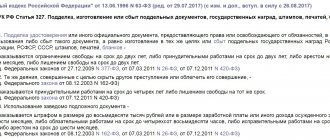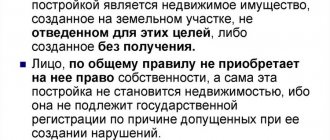Commentary to Art. 324 Criminal Code
1. Subject of the crime (alternatively): a) official documents granting rights or releasing from obligations; b) state awards of the Russian Federation, RSFSR, USSR.
2. The concept of a document combines positive and negative features. The document must be suitable for performing actions with it, expressed in illegal (in violation of established rules) acquisition or sale, that is: a) a material object; b) official. The Russian state can recognize the official status of a document, regardless of which person it comes from; c) granting rights or releasing from obligations, if this is directly stated in the document or follows from its content (diplomas, certificates, certificates, licenses, patents).
The document must not be counterfeit, must not contain information constituting a state secret, or have the characteristics of a security, since actions with such documents constitute other crimes (Articles 159, 283, 327 of the Criminal Code, etc.).
3. State awards: a) are awards of the Russian Federation, RSFSR, USSR; b) their list is strictly determined by the legislation of the relevant states.
4. The objective side consists of the illegal acquisition or sale of official documents and state awards.
Acquisition means establishing the actual possession of the specified items in any way (by purchasing, receiving as a gift, appropriation, extortion, deception or abuse of trust without signs of theft, borrowing, etc.).
The method of acquiring state awards as someone else's property and official documents cannot be their theft.
Theft of official documents committed out of mercenary or other personal interest is qualified under Art. 325 CC.
Sale means the alienation of an item in any way, in particular, through provision for use, other transfer to other persons for a fee or free of charge, with the exception of transfer for storage or as the subject of a bribe.
5. According to judicial practice, if a document was illegally acquired to commit a criminal act (fraud, tax evasion, etc.) or a decision was subsequently made to use it for such purposes, the act is classified as a set of crimes.
6. The motives and purposes of a crime can be any, with the exception of the purpose of collecting and disclosing information constituting commercial, tax or banking secrets (Article 183 of the Criminal Code).
Legal consultation
The consultant, answering some questions about the application of the norms of Article 324 and distinguishing the characteristics of committed acts, explains:
- falsification of a document and non-use of it for personal gain is determined according to the norms of the first part of Article 327;
- when using an invalid, specially prepared document to obtain benefits associated with the subsequent acquisition of rights to the property of third parties, is assessed under a combination of 30 and 327 articles.
The criminal purchase and sale of unofficial documents is prosecuted under criminal law in accordance with Articles 137 and 183.
Second commentary to Art. 324 of the Criminal Code of the Russian Federation
1. The objects of this crime are official documents and state awards.
2. Official documents are understood as: acts of authorized entities that have the necessary details, granting rights or releasing from obligations, or changing the scope of rights and obligations. According to paragraph 35 of the resolution of the Plenum of the Supreme Court of the Russian Federation dated 07/09/2013 No. 24 “On judicial practice in cases of bribery and other corruption crimes”, such documents should include, in particular, certificates of temporary disability, medical books, examination sheets, test scores books, salary certificates, protocols of procurement commissions, car registration certificates.
3. The form of the official document is written and, in accordance with the Federal Law of the Russian Federation of December 29, 1994 “On Legal Deposit of Documents”, must include a form, stamp, seal and signature of an authorized person.
4. According to Art. 6 of the Federal Law “On Electronic Signatures”, subject to the conditions specified in the Law (including the availability of details), an electronic document signed with an electronic signature is equal in its legal meaning to paper documents signed with a handwritten signature. The classification of an electronic document as a subject of crimes provided for in the articles of the Special Part of the Criminal Code depends on the nature of the acts. For example, an electronic document may be the subject of a crime under Article 327 of the Criminal Code. However, the nature of the act provided for in Article 324 of the Criminal Code (purchase or sale) presupposes an object that meets the properties of a material object.
5. State awards - the title of Hero of the Russian Federation, orders, medals, insignia and honorary titles provided for by Decree of the President of the Russian Federation of September 7, 2010 No. 1099 “On measures to improve the state award system of the Russian Federation” (together with the “Regulations on state awards of the Russian Federation ", "Statutes of orders of the Russian Federation, provisions on insignia of the Russian Federation, medals of the Russian Federation, honorary titles of the Russian Federation, descriptions of the named state awards of the Russian Federation and breastplates for honorary titles of the Russian Federation").
6. The objective side of this crime includes alternative signs of the act: acquisition or sale. Acquisition means any method of receipt: purchase, exchange, receipt as a gift, receipt for temporary use, etc. Selling it in any way and for any purpose: sale, donation, assignment, provision for temporary use. The social danger of these actions is determined by their illegality, i.e. — violation of the procedure established for receiving and issuing an official document or state award.
7. The subjective side of this crime is characterized by direct intent.
8. The subject of the crime is a person who has reached the age of 16 years.
Why United Russia won the majority of seats in the new Duma
On the eve of the elections, about a third of voters predicted support for United Russia. A week before the vote, the All-Russian Center for the Study of Public Opinion (VTsIOM) reported that the party’s rating had risen to 29.3%.
However, those who were going to spoil the ballot (and there are still those who want to) or not go to the polls at all were not taken into account, noted the authors of the video posted on the Internet. “It turns out that the number of those planning to vote is less than the total number of voters; accordingly, support for United Russia accounts for a larger percentage of the votes,” the experts explained.
The collection also included the votes of those who did not know what to do in the elections. There were 20.9 million people – almost a fifth of voters. If at least half of them reached the polling stations, and another half voted for the most popular party, then the percentage of United Russia members increases to almost 50%, the video says.
In addition, the authors called for taking into account the activity of United Russia supporters and their high discipline. Not all of them make it to the polls, but they do so more often than representatives of other electoral groups.
“It’s not surprising that United Russia received its high percentage of votes,” the video says.
There are 450 seats in the State Duma. According to the electoral legislation, half are distributed according to the proportional system by voting for parties, another 50% of the seats are distributed according to the majoritarian system, in which the candidate who receives the majority of votes in the district wins.
Under a proportional system, Duma mandates are given to only those parties for which more than 5% of voters voted. 14 parties took part in the elections of deputies to the Eighth Duma, but only five overcame the threshold. The remaining votes are distributed among the past parties.
The distribution is based on the Hare method, developed in 1855 by the British lawyer Thomas Hare. According to it, the sum of votes cast for all political forces that entered parliament is divided by 225 (the total number of mandates under the proportional system). The result obtained is the first selective quotient.
After this, the votes cast for each list that entered parliament are divided by the first electoral quotient. The number of deputy mandates for each party is determined by the integer part of the resulting number.
The remaining fractional numbers are also taken into account. For them, each party is awarded one place in order of priority, starting with the largest number after the decimal point, the authors of the video explained.
The majority system is much simpler. “Candidates follow the forecasts and know that the party in power will give them more opportunities than its opponents. Therefore, they strive to work with United Russia, run for it or win elections as self-nominated candidates, and then join the United Russia Duma faction,” experts noted.
There are 225 electoral districts in Russia. Most of them were won by such candidates. And according to the lists, “United Russia” received 126 seats, and taking into account single-mandate seats, we get that same constitutional majority – 324 seats.
“Everything is simple, expected, and most importantly – legitimate,” summed up the authors of the video.
READ "DAYS.RU" IN "TELEGRAM" - INTERESTING NEWS AND GIFTS
Third commentary to Article 324 of the Criminal Code of the Russian Federation
1. The direct object of the crime is the procedure for circulation of official documents and state awards. The subject of the crime is: a) official documents granting rights or releasing from obligations; b) state awards of the Russian Federation, RSFSR, USSR. Any documents, depending on the entity from which they come, are divided into official and unofficial. An official document is a material object with information recorded on it in the form of text, sound recording or image, certifying events or facts that have legal significance and entail legal consequences (an information document, for example, a marriage registration certificate), or conferring rights, assigning responsibilities or exempting from them (an administrative document, for example, a certificate of participation in the Great Patriotic War, a license to engage in any activity, a diploma of education, a driver’s license). An informal document is a document created by a person outside the scope of his official activities or performance of public duties (for example, a receipt for the receipt of a sum of money). In the case of certification (certification) of any unofficial document by an official, notary, or other competent authority, this document is recognized as official, since it comes from a competent person and acquires legal force. The subject of the crime under consideration is only administrative official documents. State awards are the highest form of reward for citizens for outstanding services or achievements in the defense of the Fatherland, state building, economics, science, culture, art, education, protection of health, life and rights of citizens, charitable activities and other services to the state. State awards of the Russian Federation include, for example, the title of Hero of the Russian Federation, orders, medals, insignia, and honorary titles of the Russian Federation. State awards of the RSFSR and the USSR are the title of Hero of the Soviet Union, Hero of Socialist Labor, orders, medals, honorary titles of the RSFSR and the USSR. State awards are personal and inalienable.
2. The objective side of the crime is expressed in the commission of one of two alternative actions: 1) illegal acquisition or 2) sale of the above-mentioned items of crime. Illegality of actions means their commission without the grounds established by law and the appropriate procedure. Acquisition involves the receipt of official documents or government awards for a fee or free of charge in any way (purchase, receipt as a gift, exchange, etc.). The acquisition of official documents by stealing them constitutes a crime under Art. 325 CC. The theft of state awards must be qualified under this article. Sales are formed by the paid or gratuitous transfer of specified items to another person (sale, donation, assignment, exchange, etc.).
3. The corpus delicti is formal. The crime is considered completed from the moment any of the listed actions are committed.
4. The subject of the crime is a sane individual who has reached the age of 16.
The subjective side of the crime is characterized by guilt in the form of direct intent. ‹ Article 323. Illegal change of the State Border of the Russian Federation Up Article 325. Theft or damage to documents, stamps, seals or theft of excise stamps, special stamps or marks of conformity ›








